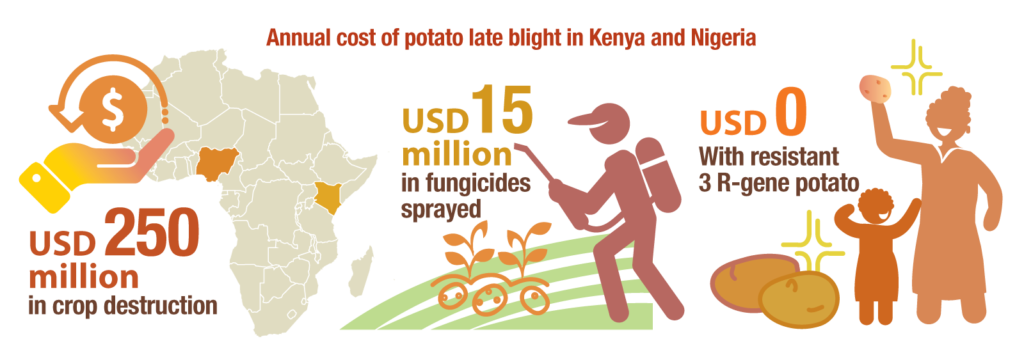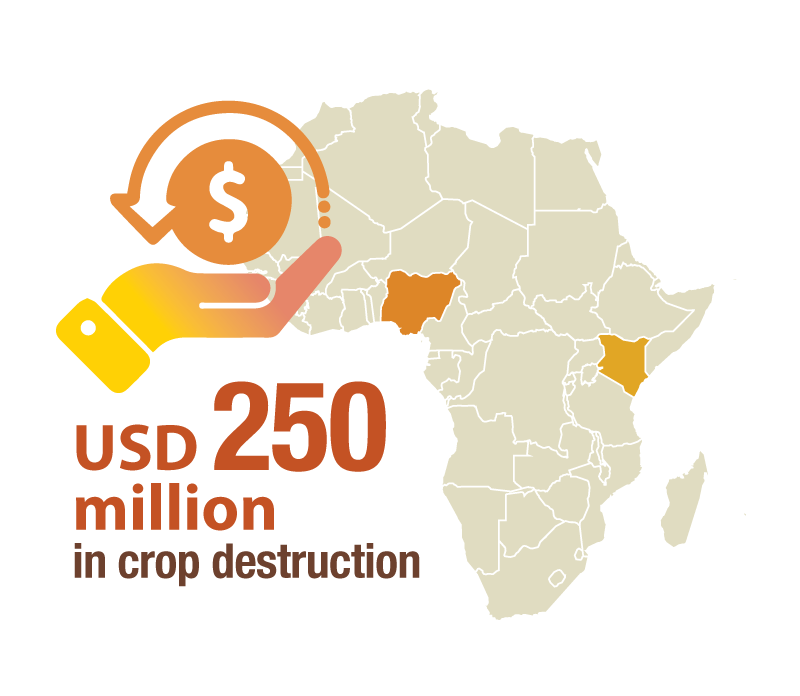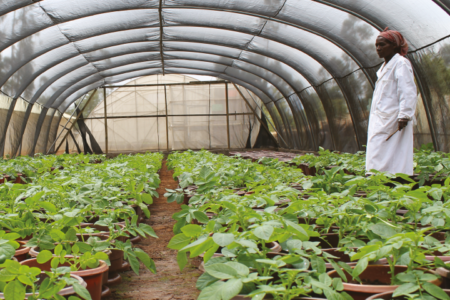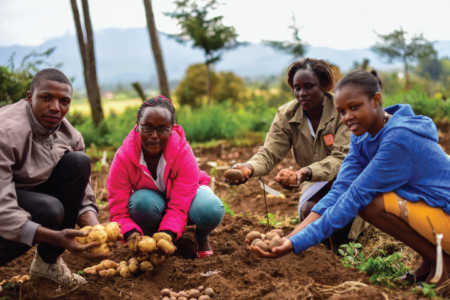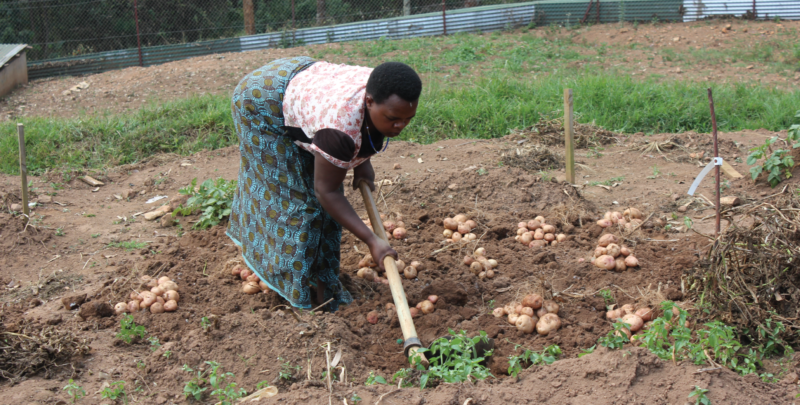
Reducing farmer vulnerability and agrochemical use with late blight-resistant potatoes.
This project aims to increase Kenyan and Nigerian farmers’ market access to genetically-engineered potato varieties which are completely resistant to late blight disease, to reduce crop losses and the need for agrochemicals.
Background
Potato is the third most important food crop worldwide, and is the highest yielding staple per acre, producing large amounts of energy-rich carbohydrates in less time and with less water than rice or wheat, as well as vitamin C, potassium, and phenolic compounds. Not being a globally traded commodity, its price is less vulnerable to food price spikes. These attributes make potato among the least expensive source of fiber, minerals, and vitamins necessary for good nutrition, which makes it an asset in addressing poverty, hunger, and malnutrition.
Despite expanding potato production, yields don’t reach their full potential in developing countries, due in large part to late blight disease, caused by Phytophthora infestans.
Globally, late blight causes annual potato crop losses of 15 –30%, worth USD 6.7 B. Through this program, CIP and partners propose to mitigate potato late blight through the deployment of resistant varieties, called “3-R-gene LBR potato”. Over the past decades, scientists have discovered resistance (R) genes in the potato’s wild relatives which stop the disease by interacting with avirulence genes of Phytophthora infestans. Three R genes were introduced simultaneously into farmers and consumers ‘preferred’ varieties from Kenya and Nigeria. The resulting potato cultivars combine characteristics that the market demands with strong and durable late blight resistance, which can reduce production costs by lowering or eliminating the need for fungicide applications, and reduce farmer exposure to those chemicals, in addition to significant potential benefits from increased yield.
Objectives
This project aims to increase market access to the 3R gene LBR potato cultivars in Kenya and Nigeria by fulfilling the following objectives:
- To demonstrate the commercial potential of the 3R gene LBR potato and build technical capacity for biotech potato field trials.
- To obtain approval from the regulatory authorities and build regulatory capacity for general release of biotech potatoes.
- To design and implement a plan for production and distribution of 3R gene LBR potato seed to farmers.
- To build the capacity of local scientists for the early development of disease-resistant (DR) biotech potatoes and contribute to the product pipeline that will result in a second-generation DR biotech potato.
- To advance knowledge of biotechnology and the benefits of genetically-engineered LBR potato to potato value chain (PVC) stakeholders to generate support for and acceptance of the product.
Approach
CIP, as part of a consortium managed by Michigan State University (MSU), will contribute to the development, testing, and deployment of genetically engineered 3Rgene LBR potato variety candidates. This effort is part of the Feed the Future Global Biotech Potato Partnership project funded by USAID. CIP will oversee the African program by coordinating technical activities among African partners as per their work plans. Staff under CIP guidance will perform ex-ante socioeconomic impact assessments and market analysis of the 3 R-gene LBR potatoes in the project countries. CIP will then coordinate field testing of 3 R-gene LBR potato variety candidates developed by CIP and MSU in Kenya, and Nigeria. The national agricultural research systems (NARS) and the MSU consortium will assess safety of the selected best performing variety candidates regarding human health and the environment. Together with MSU and African partner organizations such as AATF, CIP will advocate and communicate the potential benefits of the commercialization of the 3R gene LBR potato in the African project countries. To ensure effective seed scaling and sustainable seed delivery to farmers, the project will establish an effective public-private partnership with good stewardship practices to produce biotech potato seeds. CIP will also oversee the distribution of 3R gene LBR potato seed to selected potato farmers and assist their cultivation and marketing. Finally, CIP will play a key role in assisting national scientists to develop a new generation of 3R gene LBR and PVY virus resistant products from gene construct development to commercial release. Using its science network, CIP will continue research on the identification of the best combination of bacterial wilt resistant genes for future product development.
Expected outcomes
The overarching goal of the project is to sustainably reduce poverty, hunger, and malnutrition, helping Kenya, Nigeria, Bangladesh, and Indonesia accelerate progress toward self-reliance. To that end, the project will contribute knowledge, technologies, and other research outputs related to potato production that will directly or indirectly reduce poverty and malnutrition in smallholder households, particularly benefitting women and young children. The project will also contribute to capacity development through substantive collaborations with NARS and diverse stakeholders. The project will have the overall impact of increased access to new products of modern biotechnology among potato farmers, leading to wider adoption and integration of the 3R gene LBR potato. The expectation is that these results will enhance potato yields, improve diets, generate higher incomes while reducing agrochemical uses.
Key targets
- Assuming a 35% adoption rate, 3R gene LBR varieties in the target African countries could reduce total disease costs by USD 160—280 million (an average of USD 239 million) annual.
- In Kenya, late blight disease control is the top priority of potato farmers, with yield losses ranging from 10% to complete crop failure.
- In Nigeria, all the potato varieties currently grown are susceptible to late blight, leading to average farmer yields of around 4.2 t/ha, which is far below the world average.
- Research indicates that the 3R gene late blight resistant potato will directly increase crop yields and cut reliance on fungicides by at least 90%, greatly reducing human and environmental health risks while providing a resilient solution to the disease.
September 2021 – March 2026
US $3.9 million (total estimated award amount)
Project Profile: Link to Document
Contact
Marc Ghislain
CIP Kenya
m.ghislain@cgiar.org
Thanks to our donors


